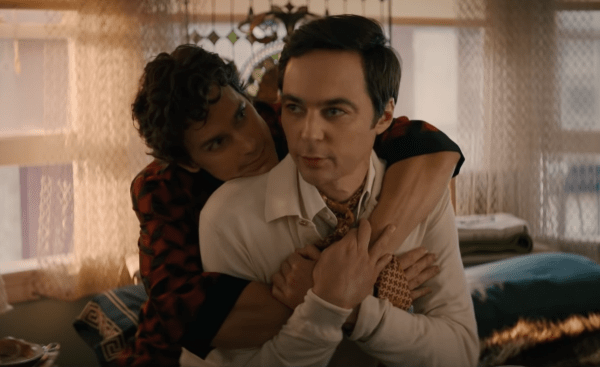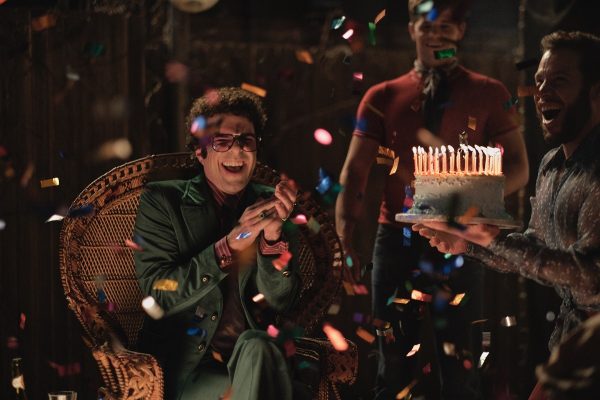The Boys in the Band, 2020.
Directed by Joe Mantello.
Starring Jim Parsons, Zachary Quinto, Matt Bomer, Andrew Rannells, Charlie Carver, Robin de Jesús, Brian Hutchison, Michael Benjamin Washington, and Tuc Watkins.
SYNOPSIS:
At a birthday party in 1968 New York, a surprise guest and a drunken game leave seven gay friends reckoning with unspoken feelings and buried truths.
Upon starting up The Boys in the Band, a remake of William Friedkin’s 1970 original based on Mart Crowley’s stage play of the same name (and who also wrote the script for the original cinematic version), it initially struck me as a missed opportunity that the New York apartment-based 1968 setting had not been updated to reflect our current sociopolitical landscape. The longer the film went on, those feelings transformed into the frustration that these character dynamics presented are still relevant. In some regards, this remake is more effective without updating anything (even some of the licensed song cues are the same containing drops from Marvin Gaye to Aretha Franklin.)
However, there is one dramatic change that, without even rolling the cameras, potentially bests the original production; it has an all-gay cast, a gay writer (Ned Martel), and a gay filmmaker (Joe Mantello), with the latter two having collaborated before on The Normal Heart exploring the AIDS and HIV epidemic. On top of that, some of the gay actors present are modern-day bonafide stars including The Big Bang Theory‘s Jim Parsons and Zachary Quinto (famous for recently playing Spock in the newer Star Trek films), except they aren’t just doing the usual strong word to be expected from them. No, they are giving some of the best performances of their careers, and in the case of Jim Parsons (while also depending on how the rest of award season releases shakes out), is deserving of Best Actor discussion. Regardless, the theatricality involved with once again adapting this play allows for some explosive acting that is up there for one of the year’s best ensembles.
The story is still the same, which sees self-loathing former alcoholic screenwriter Michael (Jim Parsons, who almost seems to be taking aspects of that beloved Sheldon Cooper sitcom character and infusing it with gradually increasing self-deprecation, bitterness, and an almost near-hatred for his sexual identity that the more his drinking relapses, the more vulnerable and emotionally scarred he becomes until your left somewhere between pitying him and being fed up with a society surrounding him that has barely evolved) hosting a supremely gay birthday party get together for his friend Harold (Zachary Quinto) and other openly homosexual guests bringing their own baggage to the evening.
Among those guests is the married and straight Alan (Brian Hutchison) who arrives blurring the line between announced and unannounced. Prior to showing up, he rings Michael on the verge of a mental breakdown that he needs to visit and tell him something. It also makes sense that he would choose Michael given that they were college roommates that would presumably have a close friendship and connection. Unsure of how Alan is going to react around so much unfiltered flamboyance, Michael (who is already uncomfortable being outwardly gay around his straight friends, bordering on, again, resenting his homosexuality) empathizes with his inner turmoil and the time-sensitive nature of the situation, extending an invitation. It turns out to not matter much, as Alan changes his mind about coming.
Alan shows up anyway, walking in on the sight of Michael doing a synchronized dance with three of his pals. And although Michael has politely asked his friends to tone down the effeminacy, it’s a request that the loud and proudly gay Emory (Robin de Jesus) can’t grant. In private, Alan calls Emory a pansy. It’s one of quite a few moments that set off an internal conflict inside of Michael, who seems to pick and choose his verbal fights based on who he is talking to and who he is standing up for. Michael makes for a fascinating character of someone that, obviously, hates homophobia (there is a small and short but powerful exchange of body language between apartment complex neighbors that speaks to the era just as the carefully crafted production design packed with objects, aesthetically pleasing interior designs, and nifty tracking shots showing off the room and patio from various perspectives), has nothing but disdain for Harald’s vanity while generalizing gays as prioritizing physical appearances above all else, and has complicated thoughts when it comes to love.
Tensions rise and the narrative drags in places (the love triangle/polyamorous subplot between Larry, Donald, and Hank also returns and is fine, but a couple other supporting characters are far less interesting), eventually reaching a phone call game (run by a now hostile Michael) where everyone has to earn as many points as they can by calling someone and professing their love. There’s also a payoff here involving Alan that, whether you have seen the original or not, should be easy to see coming but is nonetheless effective. Like a revolving door, every character gets some kind of romantic backstory and vignettes accompanying their tale, proving to be a mixed bag. Sure, it adds more to these characters, but it’s also at the expense of elongating the central story to where one just starts wondering where the hell certain characters went.
There’s also simply a sense of brokenness with hope for healing for Michael, that you don’t want the film to shift away from that focus. The unabashedly gay dialogue (much of Emory’s lines are amusing until even he gets roped into the standoff-ish dynamics at play) and gay actors delivering them provide authenticity. It’s a story dealing with closeted homosexuality in a time where some people still wish to remain in the closet for the same reasons here. Even polygamy is still seen as taboo in some circles. And it’s all brought to the forefront with boisterous performances elevating the already still poignant material.
Call Me by Your Name director Luca Guadagnino recently made some headlines for saying he had to cast Oliver, whoever that was, regardless of an actor’s real-life sexual preference. He’s not wrong, but The Boys in the Band is the evidence that a gay cast and crew can powerfully tell these stories, and that both creative philosophies should coexist. It’s also a wonderful thing seeing such artistry come together for this remake, considering it’s a blast spending time with this gay bunch navigating their homosexuality in ways that feel both antiquated and fresh.
Flickering Myth Rating – Film: ★ ★ ★ ★ / Movie: ★ ★ ★ ★
Robert Kojder is a member of the Chicago Film Critics Association and the Flickering Myth Reviews Editor. Check here for new reviews, friend me on Facebook, follow my Twitter or Letterboxd, check out my personal non-Flickering Myth affiliated Patreon, or email me at MetalGearSolid719@gmail.com















